QuestionHi Chris,
Just checked this morning and my lady bird's poo I think is going back to normal. She now has green poo and although it has not resembled a worm like consistency, it's somewhat sticky and seems to be going back to normal. Will observe in the next few days.
Have to check her eggs tonight. She just laid her 7th egg the other day. It's quit possible she is double clutching coz somewhere during her egg laying process, the guy bird was trying to land her several times, for which she was trying to avoid. Will check tonight.
Thanks.
-------------------------
Followup To
Question -
Hi Chris,
I meant two male birds were fighting through the cage wire. The injured bird is fine now.
Now there seems to be another problem. I have noticed last night that my female bird, the one that has been laying her eggs has been having wet stools. By wet, I mean wet. They are yellowish in color and are similar to a human's wet stools. Is there anything I can do? I know that they're stools ought to be greenish and color and somehow look like worms when they are expelled.
Someone told me to feed her sand. Don't know if that would work or just alleviate her condition, since it seems that she is still about to lay some more.
She's laid 7 eggs so far! My last question would be, how long more would she be laying eggs for? She's been laying for over a week now.
Thanks.
-------------------------
Followup To
Question -
Hi Chris,
You'll be happy know that my white lovebird finally laid her eggs. She now has laid 5 eggs, and I think another one is coming along. If you recall, I wrote you a week ago saying that I had two male birds and two female birds who live in one cage. I have now separated them using a cage separator and putting them in pairs.
I still am not sure whether I found the right mate for my white lovebird that gave birth. The male bird that I paired it with now, seems to be going into the bird house at night and accompanying the female. When she just laid her first few eggs, I saw that he was feeding her. Howerver lately, I am not so sure he's been doing it as I've been out at work the entire day. I will only be able to observe this tomorrow, as I am on leave from work.
One problem i have now is that when I got home yesterday, I decided to clean the cage a bit. I was shocked to find blood all over the perch of one of the pairs. I had thought that a rat had gotten into the cage, and these birds somehow tried to kill it. However, this morning, as I was trying to take a peek at my birds, I noticed one of my males had a bloody claw, which is obviously where all the blood came from! It doesn't seem to be bleeding anymore, coz I don't see anymore bloodstains on the perch. However, there's like a small tiny ball of blood on his claw.
On the other side, where my mother bird is, the otehr male bird also had a bit of blood on his claw.
Since the two males are separated, it is my assumption that these two guys had a fight. Perhaps because of jealousy.
a) Could it be that the reason why there are fighting is really because of jealousy? Or could i really have the wrong male paired with my hen that just laid eggs, and this is the reason for their fight. I've never seen them fight before.
I've seen one of the females and males fight, but not male and male.
b) What is the best way to treat his wound. It just looks like his foot/claw was pecked on. This morning, he was raising his foot as if to sleep. Can I just treat it with powdered antibiotics?
Thanks again.
Answer -
Hi, Pia.
I'm a bit confused. Are you saying the 2 male lovebirds may have been fighting through their cage wire (they are in separate cages)? Or are you saying the male and female have been fighting? Sorry, this didn't seem clear in your post.
Yes, parrots can fight due to jealousy or they can fight because one finds the other a threat to his mate and offspring, one doesn't want the other near his mate/offspring, etc. This is why pair-bonded birds need to be kept separate from other pairs of birds or single birds. I'd say with the male feeding that female, they are the true pair. Birds don't just feed any other female...this behavior is a sign of being pair-bonded.
Treating the wound - just keep the wound clean, as long as it doesn't need stitching or anything and isn't bleeding. Antibiotics are for bacterial infections, so I don't think this is necessary. I'm sure his foot is sore, which is why he is raising it. Raising it must provide some type of comfort, as most parrots do this when they have a foot or leg injury. Even when a toe nail is clipped too short, a bird will raise it's leg as if this alleviates any discomfort. This may last for several days.
You really need to do something about the fact that you have other types of wildlife that can disturb or get to your parrots. Parent birds will sometimes eat their eggs or kill their babies if they feel their offspring are or could be in any type of danger. Also, the droppings from other types of wildlife in/around your parrots can result in your parrots becoming quite ill or even dying. A rat will likely kill your parrots...not vice versa.
Chrys
Answer -
Hi again, Pia.
DO NOT feed your parrot sand. Sand (or grit or similar material) can become impacted in the bird's crop and surgery would then be required to fix the problem. Sand (grit or other) are only for birds who eat their seeds whole, like pigeons and doves. Since parrots hull their seed, they should not be fed sand or other.
Your lovebird may have some type of intestinal problem. You can wait a couple days to see if it goes away on it's own, but if it doesn't, you'll need to seek avian veterinarian assistance to determine the cause and obtain treatment. If she has some type of infection, she can pass an infection to her eggs/offspring/other birds. Since your birds are in an outside aviary, this could be a number of problems, including contracting something from wild birds or other wild life.
Lovebirds usually average 6 eggs per clutch. However, some lay less, some lay more. A full clutch takes about 1 week to be laid (1 egg every other day). 7 eggs would take about 1.5 weeks, so your lovebird is right on schedule. I would think she'd be done laying by now. Should she continue to lay eggs she might be double-clutching. Did she stop laying eggs for any period of time longer than 2 days with the 7 eggs? If she doesn't stop laying and she isn't double-clutching, then you may need to take her to an avian vet for an injection to stop the laying. This injection, however, will keep her from laying eggs for about a year.
Chrys
AnswerHi again, Pia.
Additional mating during the egg laying process doesn't result in double-clutching. Double-clutching is when the female "takes a break" of a few days/perhaps a week after laying about 6 eggs, then starts back up again laying another full clutch. Sometimes this occurs when there is some type of external disruption during egg laying, such as a move or something substantial like this. Another example would be if a pair of birds laid eggs in the cage bottom, then the owner put up a nestbox and moved all the eggs into the nestbox...a hen might start laying a new clutch in the nestbox.
Chrys

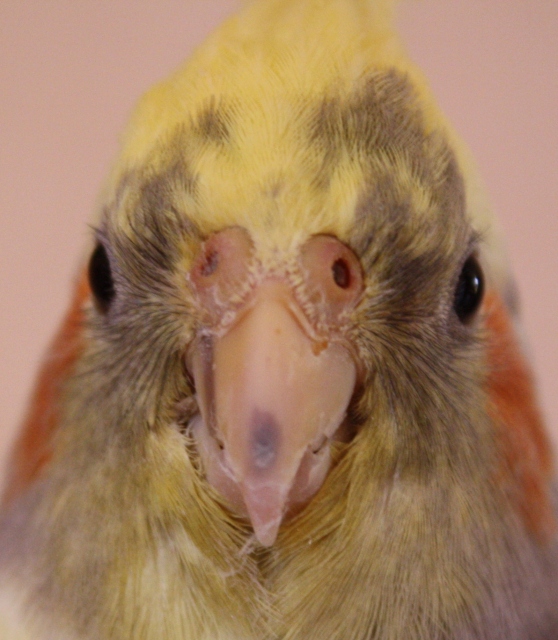 Bruise-like discoloration of beak (Cockatiel)
QuestionSasha
QUESTION: Our Cockatiel has develo
Bruise-like discoloration of beak (Cockatiel)
QuestionSasha
QUESTION: Our Cockatiel has develo
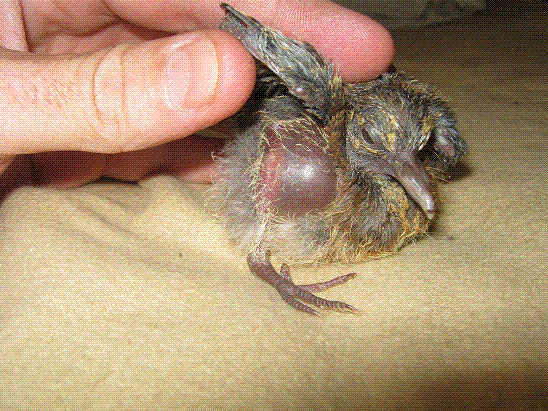 Baby Pigeon
Question
Cosmo
Hi Roger
We picked up a baby pigeon, ap
Baby Pigeon
Question
Cosmo
Hi Roger
We picked up a baby pigeon, ap
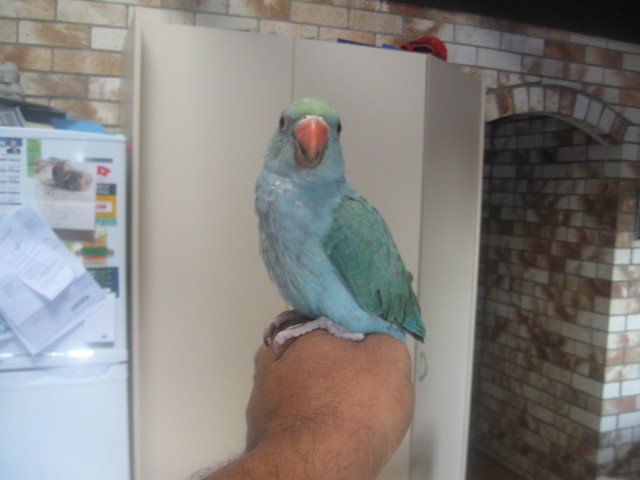 Color of my indian ringneck
Question
Boots
I have an eleven week old male ringneck
Color of my indian ringneck
Question
Boots
I have an eleven week old male ringneck
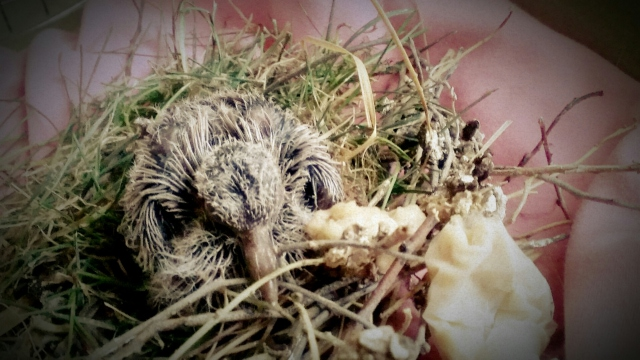 Baby Dove Care
Question
Baby Bird 1 Baby Bird 2
Hello, to
Baby Dove Care
Question
Baby Bird 1 Baby Bird 2
Hello, to
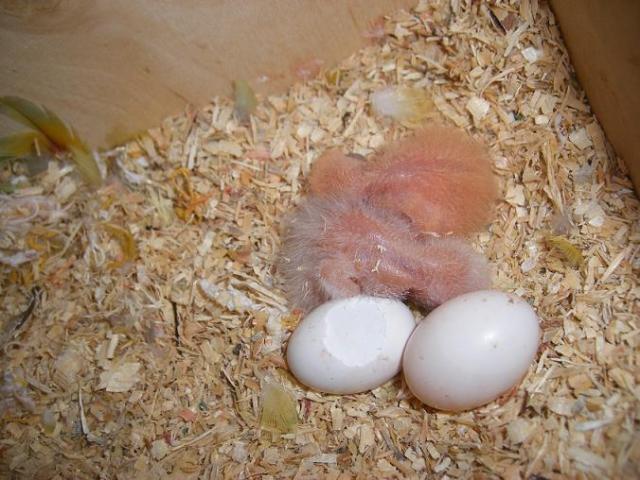 Eggs! :(
QuestionBroken Egg
QUESTION: I understand lovebi
Eggs! :(
QuestionBroken Egg
QUESTION: I understand lovebi